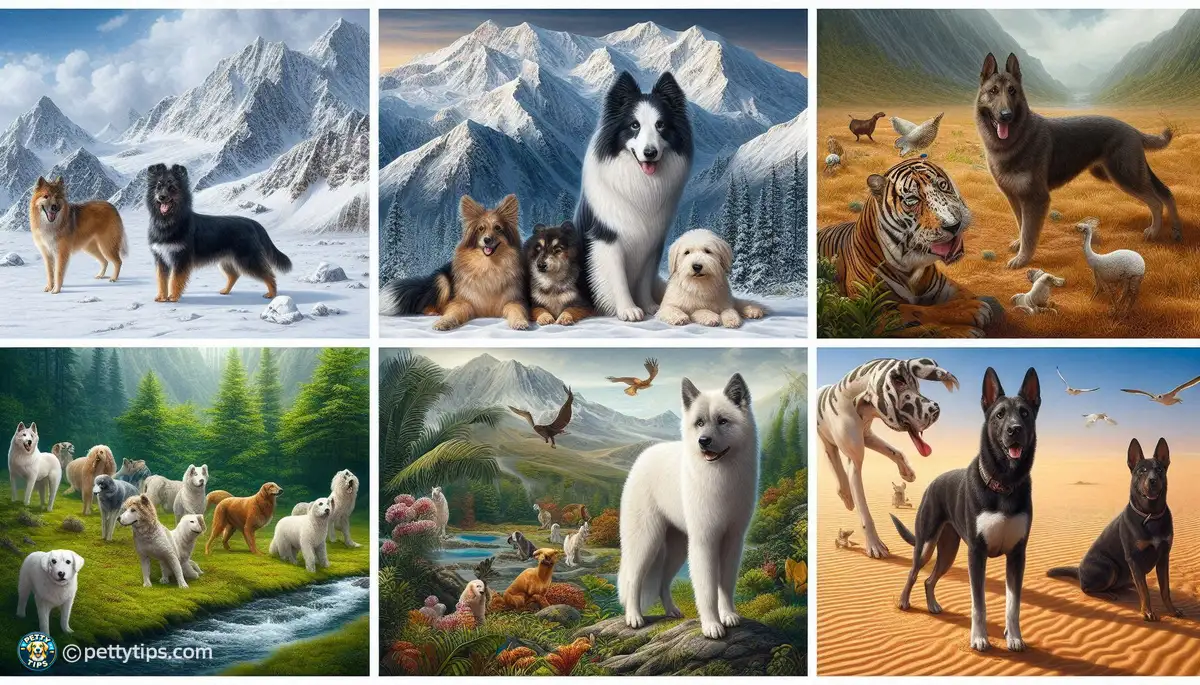
Teaching Your Puppy to Be Alone: Minimizing Separation Anxiety
Martina Pérez - Aug 20, 2024 - 6 min read


When it comes to choosing the right pet for your home, considering your environment is crucial. Different breeds have different needs and preferences, especially when it comes to climate. Before bringing a new furry friend into your life, take a close look at your surroundings. Are you living in a hot, humid area? Or perhaps you're in a colder, more temperate climate? Understanding your pet's requirements based on the climate will ensure a happy and healthy life for both of you.
Research is key when it comes to finding a pet that will thrive in your climate. Each breed has its own set of characteristics and preferences, shaped by years of evolution and adaptation to particular environments. Take the time to learn about the breeds you're interested in and how they fare in different climates. This knowledge will help you make an informed decision and find the perfect match for your home.
Don't hesitate to reach out to experts for advice. Veterinarians, breeders, and experienced pet owners can offer valuable insights into which breeds are best suited to your climate. They can provide information on specific health considerations, grooming needs, and behavioral traits that may be influenced by environmental factors. Consulting with these experts can help you narrow down your options and find a pet that will thrive in your environment.
If you're considering adoption, keep in mind that mixed-breed pets can also be a great choice for various climates. While purebred dogs and cats often have well-documented traits, mixed breeds can offer a unique blend of characteristics that make them well-suited to a range of environments. Visit your local animal shelters and rescue organizations to meet pets of all shapes and sizes, and you may just find the perfect companion for your climate.
Short-haired breeds are well-suited to hot and humid climates due to their minimal insulation. Breeds like the labrador retriever, boxer, and Dalmatian have short, sleek coats that help them stay cool in warm weather. These breeds typically shed less than their long-haired counterparts, making grooming easier in hot climates. Additionally, short-haired breeds often have a higher tolerance for heat, allowing them to enjoy outdoor activities even on the hottest days.
Brachycephalic breeds, characterized by their short noses and flat faces, can also thrive in hot and humid climates. While these breeds, such as Bulldogs, Pugs, and Boston Terriers, may be prone to respiratory issues, they often handle heat better than breeds with longer snouts. However, it's essential to take extra precautions with brachycephalic breeds in hot weather, as they can quickly overheat. Providing ample shade, water, and indoor cooling options is crucial for their well-being.
Hairless breeds, such as the Chinese Crested and the Sphynx cat, are naturally suited to hot climates due to their lack of fur. Without a coat to insulate them, these breeds are better able to regulate their body temperature in warm weather. However, it's essential to protect their sensitive skin from sunburn and other environmental hazards. Regular sunscreen application and limited sun exposure are necessary to keep hairless breeds healthy and comfortable in hot and sunny climates.
Some breeds are highly adaptable and can thrive in a variety of climates, including hot and humid environments. Mixed-breed dogs, in particular, often exhibit a combination of traits that make them well-suited to diverse climates. Additionally, breeds like the australian shepherd and the Basenji have evolved to handle a range of environmental conditions, thanks to their hardy genetics and resilient nature. These versatile breeds can make excellent companions for pet owners living in hot and humid climates.
Double-coated breeds are well-equipped to handle cold and temperate climates thanks to their thick, insulating fur. Breeds like the Siberian Husky, Alaskan Malamute, and Newfoundland have two layers of fur that provide excellent protection against the cold. These breeds often thrive in snowy environments and enjoy outdoor activities like hiking and sledding. However, it's essential to provide adequate shelter and protection from extreme weather conditions to ensure their well-being.
Some breeds are specifically bred for cold climates and excel in chilly temperatures. Breeds like the Samoyed, Bernese Mountain Dog, and Saint Bernard have thick coats and sturdy builds that help them withstand cold weather. These breeds often have a natural affinity for snow and may enjoy activities like snowshoeing and skiing with their owners. However, it's crucial to monitor them closely in freezing temperatures and provide warmth and shelter when needed.
Nordic breeds, originating from northern regions like Scandinavia and Russia, are well-suited to cold and temperate climates. Breeds like the Norwegian Elkhound, Finnish Spitz, and Swedish Vallhund have evolved to thrive in harsh winter conditions, thanks to their robust physiques and dense fur coats. These breeds often have a high energy level and enjoy outdoor activities in cooler weather, making them ideal companions for active individuals living in cold climates.
Some breeds have adapted to cold climates over generations, developing traits that help them survive and thrive in chilly temperatures. Breeds like the Tibetan Mastiff and the Tibetan Terrier are native to mountainous regions with harsh climates, where they've learned to navigate rugged terrain and endure freezing temperatures. These cold-adapted breeds often have thick, weather-resistant coats and a resilient disposition that makes them well-suited to cold and temperate climates.
Choosing the right pet for your environment is essential for their health and happiness. By considering your climate and researching breed characteristics, you can find a companion that will thrive in your home. Whether you're living in a hot and humid climate or a cold and temperate one, there are breeds out there that are perfectly suited to your lifestyle. Consulting with experts and considering adoption can help you narrow down your options and find the perfect match for your environment. With the right pet by your side, you can enjoy many years of companionship and joy together.